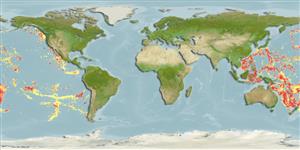Classificação / Names
Nomes comuns | Sinónimos | Catalog of Fishes(Género, Espécies) | ITIS | CoL | WoRMS | Cloffa
>
Acropomatiformes (Oceanic basses) >
Epigonidae (Deepwater cardinalfishes)
Etymology: Brephostoma: Greek, brephos = babe + Greek, stoma = mouth (Ref. 45335).
Eponymy: Captain Alfred Carpenter RN DSO was the Commander of H M Indian Marine Survey Steamer ‘Investigator’. [...] (Ref. 128868), visit book page.
More on author: Alcock.
Environment: milieu / climate zone / depth range / distribution range
Ecologia
marinhas batidemersal; intervalo de profundidade 500 - 2782 m (Ref. 58018). Deep-water
Western Central Pacific: Papua New Guinea (Ref. 6192); also reported from the Hawaiian Islands (Ref. 58302).
Tamanho / Peso / Idade
Maturity: Lm ? range ? - ? cm
Max length : 10.2 cm TL macho/indeterminado; (Ref. 41039)
Life cycle and mating behavior
Maturidade | Reprodução | Desova | Ovos | Fecundidade | Larvas
Kailola, P.J., 1987. The fishes of Papua New Guinea: a revised and annotated checklist. Vol. II Scorpaenidae to Callionymidae. Research Bulletin No. 41, Research Section, Dept. of Fisheries and Marine Resources, Papua New Guinea. (Ref. 6192)
Categoria na Lista Vermelha da IUCN (Ref. 130435: Version 2024-2)
Ameaça para o homem
Harmless
Utilização humana
Ferramentas
Relatórios especiais
Descarregue XML
Fontes da internet
Estimates based on models
Preferred temperature (Ref.
123201): 2.8 - 5.4, mean 3.8 °C (based on 810 cells).
Phylogenetic diversity index (Ref.
82804): PD
50 = 1.0000 [Uniqueness, from 0.5 = low to 2.0 = high].
Bayesian length-weight: a=0.01000 (0.00244 - 0.04107), b=3.04 (2.81 - 3.27), in cm total length, based on all LWR estimates for this body shape (Ref.
93245).
Nível Trófico (Ref.
69278): 3.3 ±0.5 se; based on size and trophs of closest relatives
Resiliência (Ref.
120179): Elevada, tempo mínimo de duplicação da população menor que 15 meses (Preliminary K or Fecundity.).
Fishing Vulnerability (Ref.
59153): Low vulnerability (10 of 100).
